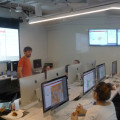
On November 16, the Tishman Environment and Design Center (TEDC) and Global Urban Futures Project held a panel discussion about the historic COP21 Climate Summit and its implications for the future. This event, “The Alternative Road to Paris: Examining the UN Climate Summit,” hosted diverse panelists with a range of perspectives on the upcoming climate talks. The discussion focused on the hopes and expectations of various stakeholders for the outcome of the climate negotiations as well as the prospects for climate action beyond the talks in Paris.
What is COP21?
COP stands for Conference of the Parties, an annual meeting of all nations that make up the United Nations Framework on Climate Change — 195 nations in total. This is the 21st meeting (thus COP21), with the first occurring in Berlin in 1995.
The purpose of the meetings is to continually assess member nations’ progress towards addressing climate change, negotiate agreements and set goals for reducing greenhouse gas emissions that are the primary drivers of climate change. Previous memorable meetings include COP3 in Kyoto, Japan, which brought about the Kyoto Protocol; COP11, which generated the Montreal Action Plan; and COP15 in Copenhagen, Denmark, which was largely deemed a failure because a binding agreement wasn’t reached.
Tragedy in Paris Leads to Important Humanitarian Discussion
It was an especially sobering discussion in light of the coordinated attacks in Paris on November 13th. Michelle DePass, the Director of the Tishman Environment and Design Center and Dean of the Milano School of International Affairs, Management, and Urban Policy opened with a moment of silence. She discussed The New School’s commitment to tolerance, and to engaging with difficult, complex social issues in a critical manner and most importantly to the non-violent promotion of social justice. The discussion focused on themes of justice, climate impacts, and the role of civil society, state and non state actors in the promotion of climate action.
The conversation begins
Shagun Mehrotra, professor of Sustainable Development at the Milano School of International Affairs, Management, and Urban Policy began the conversation with a special presentation regarding the significance of COP21 and the history of climate negotiations. This presentation set the stage for understanding the expectations and concrete steps that nations will be bringing to the table in Paris. He also discussed the important role of cities in this international conversation. Cities’ commitments will be an extremely important determining factor on whether society can reach a two degree cap on warming to avert the worst impacts of climate change. His presentation included an animated history of climate negotiations.
The panel, moderated by Parsons Executive Dean Joel Towers, then turned its focus to a discussion of COP21’s significance in light of recent events in Paris and other parts of the world.
Honduran Ambassador Mary Elizabeth Flores Flake discussed how natural disasters, due largely to climate change, have affected countless people around the world, including the people of Honduras. The Ambassador framed addressing climate change as a “moral imperative” and a shared global responsibility. Her Excellency discussed how Honduras intends to contribute to addressing climate change by cutting their greenhouse gas (GHG) emissions by 15% relative to its 2012-2030 business as usual scenario. However, this commitment is conditional on the receipt of international assistance and climate finance. Honduras also commits to reforest one million hectares by 2030.
The Ambassador described the devastating impacts that successive Hurricanes wreaked on the country and the relatively small contribution that Honduras has contributed to global climate change. This imbalance is representative of the larger global climate injustices that developing and developed countries will be negotiating in Paris.
Shay O’Reilly, an educator, preacher and faith-based organizer from the Center for Earth Ethics, brought a unique perspective as a faith leader in the climate movement. O’Reilly made a case for religious engagement in the climate change conversation. O’Reilly discussed how religion often has the capacity to envision a different world. It can lead to an entirely new understanding of our society and how we live with each other as people.
The role of religion in the climate movement is crucial because religion is hugely significant in many of the communities that are most impacted by climate change. O’Reilly suggested that faith can provide a strong foundation on which to take action to correct climate injustices and is a powerful platform for urging political leaders and lay people to act on climate. Religion can also form a discourse that stretches across national boundaries. It can cross cultural and economic barriers in order to help people understand our common humanity and interests.
Stefan Ali, Esq. is an Environmental Justice Organizer at Ironbound Community Corporation in Newark, NJ, a community close to The New School’s home in NYC that is severely impacted by pollution. He shared a firsthand account of people in his community who have developed cancer and other health conditions as a direct result of environmental exposures and who were also devastated by Hurricane Sandy. To him, the conversation about climate change it is not just about the climate, it is about human health and survival.
Ali will be in Paris during COP21 as a member of the Grassroots Global Justice Alliance delegation where he will be supporting the movement to demand that government officials make commitments to cut carbon emissions at the source, keep fossil fuels in the ground, and pursue local solutions for clean, renewable energy. The mantra of the Grassroots Global Justice Alliance is “No War, No Warming” which is a reminder that many communities at the frontlines of climate impacts experience firsthand the interconnections between political instability and global conflict and climate disruptions. Thus their delegation will be headed to Paris to spur a broader conversation about alternative approaches to economic development, political accountability and climate action that is more just.
Ana Baptista, Assistant Professor of Professional Practice in the Environmental Policy and Sustainability Management Program at the Milano School is also a native of the Ironbound community in New Jersey. As a child, Professor Baptista was strongly attuned to the inequalities in her own backyard. These economic and racial systems of inequality are not just in the developing world, but in our communities close to home. Professor Baptista discussed how systems that drive oppression are also driving climate change. These issues can manifest themselves in climate disasters like Hurricane Sandy or in more slow and often invisible displacements and impacts of the most vulnerable people and communities around the globe. Professor Baptista discussed the need to address climate impacts on the most vulnerable communities at home and in the global south.
Climate change is a universal cause that can unite very diverse social movements. There is hope that now there is an opportunity to push for solutions beyond COP21. Translocal conversations are already happening among communities, organizations and young people around the world. Examples of these include: indigenous groups in Canada, environmental justice groups in the US, housing and women’s rights groups in places like China and India are all having the conversations about how to move a climate agenda forward. They will be pushing for accountability around agreements and looking at the details of those agreements to ensure that they do not result in further exploitation of vulnerable communities and exacerbation of climate injustices.
Michael Cohen, a professor of International Affairs and lead organizer for the Global Urban Futures project at the Milano School discussed two critical aspects that can contribute to climate change solutions. These include, local behaviors that impact larger scale climate issues and our global interdependence. Professor Cohen discussed how local populations need to be included in climate conversations because individual behaviors can have very far reaching positive impacts. He suggests that climate change will not be address simply with large national commitments, but will also require countless, small choices. He reiterated the popular adage that people need to think globally and act locally.
Professor Cohen also stressed that regardless of nationality, human societies are extremely interdependent. Developing countries and developed countries both need to make commitments towards the climate agreements.
Taylor Drake is an undergraduate Environmental Studies and Product Design student at The New School. He hopes to engage The New School community in the broader climate conversations by hosting a student run simulation of COP21 negotiations. This exercise can give students important insights into the challenges and opportunities that countries face during climate negotiations. In addition to the COP simulation, Taylor also drafted a letter with New School students that includes a list of demands and a vision for the COP21 talks in Paris which he hopes to send to the US delegates to the climate talks.
Questions from the audience covered a range of issues from the impacts of economic trade agreements on climate change, the structure of climate adaptation funding, the binding nature of the agreement and the role of developing countries in the climate negotiations.
At the end of the panel, graduate students in Shagun Mehrota’s Climate Change and Cities course hosted a presentation reflecting their examination of global cities and their analysis of climate vulnerabilities.. They proposed solutions for the specific challenges faced in each city and discussed the significance of these impacts in relation to global climate talks.
Upcoming in Paris
Professor Ana Baptista will be hosting a conversation with two panelists – Ananda Tan and Monique Verdin – from civil society about the climate talks with students at Parsons Paris during COP21. This conversation will focus on the hopes for the climate negotiations and the vision of potential climate action beyond the national agreements reached in Paris. The panel will be hosted on December 3rd in partnership with Parsons Paris and the Tishman Environment and Design Center.




